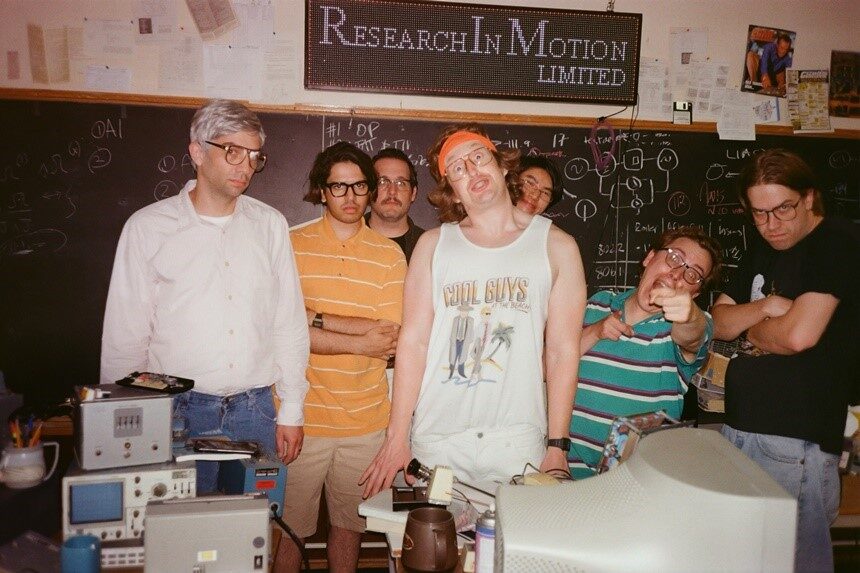BlackBerry
⭐️ ⭐️ ⭐️ ⭐️
Rating: R
Run Time: 1 hour 59 minutes
Stars: Jay Baruchel, Glenn Howerton, Matt Johnson
Writers: Matt Johnson, Jacquie McNish, Matthew Miller
Director: Matt Johnson
Okay, we’ve definitely got a new film genre here: Fictionalized depictions of how culture-defining products came to be.
The Social Network related the genesis of Facebook. Tetris traced the story behind the video game. Air gave us the untold history of Nike. And now here’s BlackBerry, a wildly entertaining account of, as one character describes it, “The smart phone everyone had before they had an iPhone.”
We’ll call it Commodity Cinema.
It’s important to note that all of the above mentioned are very good movies, and it’s easy to understand why. As a cursory viewing of any Shark Tank episode will demonstrate, the trials and triumphs of a business startup — large or small — can often attain operatic levels. Raise the stakes to involve a product that is directly related to the phones that are right now in the pocket of nearly every American adult, and the audience’s investment in the story is sky-high.
Mike Lazaridis (Jay Baruchel) and Doug Fregin (Matt Johnson, who also directs and co-writes) are a couple of 1980s Canadian tech wonks, keeping the lights on in their struggling Windsor, Ontario, business by building telephone modems for large companies. Their ultimate dream is to market the pet project they’ve been working on for years: A hand-held phone/e-mail device.
But while Mike and Doug may be wizards in the lab, they are absolute flops in the pitch room. Between Mike’s mumbling utterances and Doug’s surfer dude demeanor, they barely get past their initial lines in the opening scene before they’re summarily dismissed by a distracted tech company executive named Jim Balsillie (It’s Always Sunny in Philadelphia’s Glenn Howerton).
Still, something about the pair’s concept of a smart phone that utilizes an unused Internet frequency sticks with Balsillie. When he finds himself suddenly out of a job, he tells Mike and Doug he’s just the guy to push them to the next level.
And that he does: Soon Balsillie and Mike are in New York City, pitching their new product in the boardroom of AT&T (The movie would have us believe the iconic BlackBerry name comes to Balsillie on the spot, upon noticing a blackberry jelly stain on Mike’s shirt).
Almost overnight, the BlackBerry rockets to near-ubiquitous presence in the telecommunications universe (remember when we called them CrackBerries?). Then, in an oft-told tale, a little upstart called the iPhone arrives on the scene, offering a sleek, black, handheld screen that promises to make all your dreams come true with something called “apps.”
At first the BlackBerry team tries to ignore the upstart. “It’s all about the keyboard,” Mike assures the AT&T board. “People want to feel that ‘click’ when they type.” In the movie’s telling, it’s this stubborn resistance to change that dooms the BlackBerry to irrelevance.
Maybe; or perhaps in the arc of technological history the BlackBerry was always going to be a transitional product. In any case, director/co-writer Johnson is a lot less interested in the actual rise and fall of BlackBerry than he is in the personalities involved.
As Mike, Baruchel brings tortured complexity to the central character. We meet him as a collared-shirt-and-pocket-protector computer geek; a guy who is a lot more comfortable crunching numbers than engaging with human beings. Staring at the floor, speaking in a strangled monotone, Baruchel’s Mike seems like the classic failed inventor: One who would rather perpetually tinker on a project than lose control by actually releasing it to the world.
But with success comes a different Mike: His formerly short-cropped hair is now a luxurious, swept-back silver wave. He’s traded his button-down look for a black-shirted Steve Jobs style. Instead of engendering camaraderie with the troops, he’s become a stern boss man. Baruchel handles the transition effectively, but not seamlessly: The change occurs in a single cut, and without any kind of organic shift, it almost seems like Baruchel is playing two entirely different characters.
More consistent is Howerton as Balsillie, the hard-driving executive who, through sheer force of will, powers BlackBerry to market dominance. Howerton creates in Balsillie a soulless opportunist with a politician’s knack for truth-twisting and a samurai’s skill at leg-cutting. He is, at the start, exactly what BlackBerry needs. At the end, he is the poster boy for everything that went wrong.
As Doug, the BlackBerry cofounder caught between Mike and Balsillie, Johnson has gifted himself with the film’s most refreshing role. Sporting a variety of t-shirts and a trademark red bandana (even when he’s wearing a business suit), Doug infuses BlackBerry with a healthy dose of who-cares informality. As was the case with the actual Doug Fregin — who walked away from BlackBerry at its height, a very rich man — the film Doug manages to thrive without throwing everything else away.
As you’d expect, there’s a lot of narrative streamlining here. The film ignores the fact that BlackBerry had not two, but three co-founders. While it is implies that the iPhone, introduced in 2007, caused BlackBerry’s immediate implosion, BlackBerry’s most successful sales year — nearly 55 million units — came in 2011. And indeed, by this telling you might think BlackBerry ended up a failed company when, in fact, it remains a leading player in the cyber security business.
They do not, however, make smart phones. BlackBerry is an engaging, engrossing, and surprisingly human account of how they got from there to here.
Become a Saturday Evening Post member and enjoy unlimited access. Subscribe now



